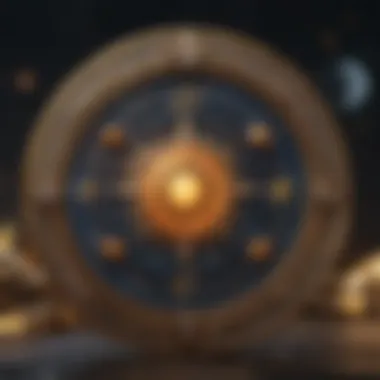Unveiling the Secrets of Astrological Compatibility


Intro
Astrology has captured human interest for centuries. Many seek insights into relationships through astrological compatibility. This guide explores astrological compatibility calculators, examining their use in understanding romantic and social interactions. The popularity of such tools has risen, indicating a yearning for deeper connections and self-awareness.
Why Compatibility Matters
Astrological compatibility is not merely a matter of comparing Zodiac signs. It provides a framework that individuals can leverage for introspection and decision-making. Calculators often consider the positions of celestial bodies at birth, offering a lens to view personal traits and their alignment with others. This understanding can influence choices in both romantic endeavors and friendships, shaping human interactions on several levels.
The Role of Technology
In the digital age, compatibility calculators are accessible through various platforms. Users can input their and their partner's birth details to receive personalized insights. These tools range from simple online quizzes to sophisticated software analyzing intricate astrological data. Yet, while they can be informative, the delivered results should be interpreted thoughtfully, keeping in mind personal experiences.
Scope of the Article
The following sections will cover:
- Different types of compatibility calculators
- Methodologies used to establish compatibility
- The significance of astrological insights in relationships
- Potential limitations and cautions regarding automated interpretations
By the end of this article, readers will gain comprehensive awareness of how astrological compatibility calculators can aid in understanding their relationships.
Prelude to Astrological Compatibility
Astrological compatibility refers to the relationship between two individuals based on their astrological profiles. In an increasingly complex world, many seek to understand their relationships through various lenses. Astrology offers one such perspective, providing insights based on the celestial positions at the time of an individual's birth. This section of the article emphasizes the significance of astrological compatibility in fostering healthier relationships.
Definition of Astrological Compatibility
Astrological compatibility is commonly understood as the degree to which two individuals can harmonize in a romantic or platonic relationship based on their zodiac signs and other astrological factors. This concept is deeply rooted in the belief that the positions of planets and stars influence human behavior and interpersonal dynamics. Each zodiac sign possesses unique traits, strengths, and vulnerabilities; therefore, analyzing these characteristics can reveal how they interact when paired with another sign. In specific terms, astrological compatibility often involves examining sun signs, moon signs, and ascendants, among other factors. It is an intricate field, blending various astrological components to develop a deeper understanding of how individuals can relate to each other.
Importance of Compatibility in Relationships
The significance of astrological compatibility in relationships extends beyond mere curiosity. Here are some key aspects to consider:
- Improved Understanding: Knowing compatibility can aid individuals in understanding each other's emotional needs and tendencies. It provides a framework to comprehend a partner’s behavior and reactions.
- Conflict Resolution: Recognizing differences through astrology may assist in navigating conflicts. Understanding contrasting traits can lead to more effective communication.
- Personal Growth: Engaging with astrological insights can promote personal reflection, encouraging both partners to grow individually and together.
- Guidance in Relationship Decisions: Many people look to astrology for guidance in making decisions about relationships. It may affirm their choices or suggest reconsideration.
Astrological compatibility calculators have emerged as tools that offer quick assessments to evaluate the potential for harmony between two people. However, it is vital to understand that while calculators provide valuable insights, they can only offer a part of the larger picture. Engaging deeply with astrological concepts, such as the significance of the birth chart, allows for a more thorough understanding of compatibility.
Understanding astrological compatibility is not just about predictions; it is about fostering deeper connections based on self-awareness and mutual respect.
Understanding Astrology Basics
In the realm of astrological compatibility, gaining a solid understanding of astrology basics is paramount. This foundation aids in unraveling how various celestial points influence interpersonal dynamics. Knowing the elements, signs, and houses helps individuals grasp the complexities of astrological calculators and the interpretations they yield. Understanding these basic tenets offers insights into oneself and the various partners one may seek, allowing for a deeper exploration into relationships.
Overview of Zodiac Signs
The zodiac comprises twelve distinct signs, each representing unique characteristics and attributes. These signs are divided into four elements: fire, earth, air, and water. For instance, Aries, Leo, and Sagittarius fall under fire, signifying passion and energy. On the other hand, Virgo, Taurus, and Capricorn are earth signs, often linked with practicality and stability. Familiarity with zodiac signs enables individuals to see personality traits that affect compatibility.
Astrological compatibility calculators often compare these signs to determine potential relationship dynamics. For example, a fire sign can have a different interaction style with an earth sign compared to another fire sign. Recognizing these interactions not only elucidates individual traits but also facilitates better communication and understanding in relationships.
Elements and Modalities
Each zodiac sign is categorized not just by its unique attributes but also by its modality: cardinal, fixed, or mutable. Cardinal signs like Aries and Cancer initiate change, bringing dynamism into relationships. Fixed signs, such as Taurus and Scorpio, seek stability and often prefer established routines. Meanwhile, mutable signs like Gemini and Sagittarius are adaptable, thriving on variability and spontaneity.
Understanding elements and modalities is crucial when assessing compatibility. For instance, pairing a cardinal sign with a fixed sign might result in a clash of desires for change versus stability. This nuanced knowledge allows users of compatibility calculators to gain comprehensive insights into relationship dynamics beyond mere sun sign interpretations.
The Role of Houses in Astrology


Houses in astrology represent different areas of life, such as love, career, and personal relationships. There are twelve houses, and each house influences various aspects of an individual’s life experiences. For instance, the seventh house is dedicated to partnerships and marriage, inherently linking it with astrological compatibility.
Understanding how houses operate is fundamental for compatibility analyses. When evaluating two individuals' compatibility, examining the placement of planets in their respective houses reveals how they might interact in specific areas of their lives. Hence, compatibility calculators that take house positions into account provide deeper insights into relationship potential.
How Astrological Compatibility Calculators Work
Astrological compatibility calculators serve as tools that help individuals assess relationship dynamics through the lens of astrology. Understanding how these calculators function is essential for astrological enthusiasts and practitioners. They allow users to gain insights into potential connections, challenges, and areas of growth within relationships. In this section, we will explore how these calculators operate, including the various calculation methods, fundamental data inputs, and the common algorithms used to compute compatibility scores.
Calculation Methods
The calculation methods employed by astrological compatibility calculators can vary. Some calculators use simple zodiac sign matching, where the elemental compatibilities are assessed. For instance, a fire sign, like Aries, is compatible with another fire sign or an air sign, like Gemini. However, the more advanced calculators go deeper. They might implement synastry, which overlays two birth charts to analyze the interactions between planets. This method reveals insights into how individuals influence each other, providing a detailed look at their compatibility.
Additionally, some calculators use composite charts. A composite chart combines the two individual charts into one, representing the relationship itself. Each method brings unique insights and varying degrees of complexity, catering to both novice users and experienced astrologers.
Data Inputs Required
To generate compatibility results, calculators generally require specific data inputs. Here are the main elements typically needed:
- Date of Birth: Essential for calculating sun signs and other astrological placements.
- Time of Birth: Influential for determining rising signs and house placements.
- Place of Birth: Geographic location affects planetary positions in the individuals' charts.
These inputs allow the calculators to create accurate and personalized charts. The more precise the data provided, the more insightful the results will be. Users must ensure that the information given is correct to avoid misinterpretations.
Common Algorithms Used
Many calculators rely on algorithms that determine compatibility through complex mathematical models. One prevalent model is the Venus-Mars approach, which evaluates the aspects (relationships between planets) of Venus and Mars positions in both charts. This model can reveal romantic compatibility, as Venus represents love and Mars symbolizes desire.
Another common algorithm is the Harmony score, which quantifies the overall compatibility based on numerous aspects between charts. This score usually ranges from a low to high percentage, illustrating how well two individuals may connect on various levels.
Understanding the various calculation methods, data requirements, and algorithms highlights the intricacies of astrological compatibility calculators. They go beyond simple star sign matches, offering profound insights into relational dynamics.
Types of Compatibility Calculators
Understanding types of compatibility calculators is essential for those exploring astrological tools. These calculators offer a spectrum of insights, facilitating a deeper comprehension of individual relationships. The type of calculator chosen can greatly influence the insights gained, making the selection process vital. They can range from simple assessments to in-depth analyses, each serving different goals and backgrounds.
Basic Compatibility Checks
Basic compatibility checks are often the first step for individuals curious about astrological connections. These calculators generally focus on sun signs, which is a straightforward approach to assessing compatibility. The process is user-friendly: one needs only the birth dates of the individuals involved.
Here are some insights into basic compatibility checks:
- Quick Results: They provide immediate answers, which can satisfy initial curiosity.
- High Accessibility: Many online platforms offer these tools for free, making them easy for anyone to access.
- Foundation for Further Exploration: Often, this can lead users to seek more detailed analyses to enrich their understanding of the relationship.
However, while useful, users should approach these checks with caution. Basic compatibility does not account for the nuances within natal charts and can lead to oversimplified conclusions.
Advanced Synastry Reports
Advanced synastry reports dive much deeper than basic checks, offering a comprehensive view of relational dynamics. Synastry is the study of how two astrological charts interact with each other. This method takes into account all key elements from both charts, including but not limited to sun, moon, rising signs, and planetary positions.
Key features include:
- In-Depth Analysis: Reports explore various aspects, such as the relationship's strengths, challenges, and growth opportunities.
- Personalized Feedback: Many services offer tailored interpretations based on precise birth data, recognizing unique relational patterns.
- Compatibility Rating: Advanced calculators may provide numerical ratings or compatibility scores to quantify the relationship.
While these reports can provide valuable insights, it is crucial to keep in mind that they require higher accuracy in data to yield meaningful results. Misinterpretation or inaccuracies in birth times or dates can significantly distort insights.
Personalized Astrology Analyses
Personalized astrology analyses represent the pinnacle of astrological compatibility tools. Unlike other methods that only assess sun signs or synastry, this approach encompasses a holistic view of both individuals involved. This type of analysis considers not only astrological placements but also personal experiences, growth patterns, and life challenges.


This type of analysis presents:
- Customized Insights: Each report is uniquely tailored to the individual experiences, providing specific advice or reflections based on personal charts.
- Holistic Viewpoint: It considers a plethora of elements, from transits to personal development phases, and how these elements may affect relationship dynamics.
- Actionable Strategies: Often, these insights come with actionable advice on how to navigate specific relational challenges or enhance intimacy.
These analyses can be more complex and costly but tend to yield deeper revelations about a person's emotional landscape and how it interacts with another's.
Engaging with varied types of compatibility calculators helps individuals navigate complex relational dynamics. Each type serves a unique purpose and can guide those seeking astrological insights into their personal and interpersonal lives.
Limitations of Astrological Compatibility Calculators
Astrological compatibility calculators are tools designed to analyze relationships based on the principles of astrology. While these calculators offer intriguing insights, they come with limitations that need to be recognized. Understanding these constraints is essential for both practitioners and seekers of astrological wisdom. Without this knowledge, clients might rely too heavily on results without considering the broader picture that encompasses their personal experiences and choices.
Generalization of Results
One major limitation of astrological compatibility calculators is their tendency to generalize results. Astrology involves a myriad of factors, including the positions of planets, houses, and specific aspects that often get overlooked. Many calculators simplify complex astrological charts into binary compatibility scores or simplified summaries. This reductionist approach can lead to misleading interpretations. For example, two individuals may share the same sun signs but have vastly different rising and moon signs, which play crucial roles in their personalities and relationship dynamics.
Because calculators often utilize predefined criteria and templates, users may receive results that do not resonate with their real dynamics. This can create a false sense of certainty, leading individuals to dismiss relationships solely based on calculated compatibility percentages. It's essential for users to acknowledge this limitation and seek more nuanced understanding beyond simple calculator outcomes.
Inability to Capture Nuances
Astrology is inherently complex, and compatibility is not merely a matter of matching sign attributes. Calculators often fail to capture the subtleties and intricacies present in each relationship. Personal experiences, emotional connections, and individual growth can heavily influence how compatibility manifests.
For instance, transits and progressions may alter the dynamics between partners. A calculator might not account for the ongoing effects of these shifts on personal feelings and interactions. Moreover, individual psychological factors, such as attachment styles and life experiences, significantly shape relationships. A calculator that does not consider these elements can provide a one-dimensional view, lacking depth and understanding.
In closing, awareness of these limitations helps in setting realistic expectations while using astrological compatibility calculators. For more comprehensive insights, individuals may want to consult professional astrologers who can interpret charts in a more personalized and nuanced manner. Understanding these limitations ultimately allows seekers to approach astrology as a supportive tool for growth and self-awareness, rather than a definitive answer to relationship inquiries.
Personalized Astrological Insights
Personalized astrological insights leverage individual birth charts to give unique understandings of compatibility. This section analyzes how these insights differ from standard compatibility calculators. It is important to recognize that while calculators often provide generalized results based on surface-level traits, personalized insights tap into the intricate details of an individual's astrological makeup. These insights offer deeper reflections on how two individuals interact based on the full spectrum of their astrological charts.
Analyzing Birth Charts
Every individual has a distinct birth chart created at the moment of their birth. It encompasses the positions of celestial bodies, houses, and nodes which reveal personal traits, strengths, and challenges. When examining compatibility, analyzing each partner's birth chart allows for a thorough exploration of how their qualities mesh together.
- Understanding Key Elements:
- House Placement: Each planet resides in a specific house in a chart, influencing various life sectors. For instance, if one person's Venus (which relates to love and relationships) falls into another's fourth house (home and family), it suggests a favorable link concerning nurturing and domesticity.
- Aspects Between Charts: These describe the angles formed between planets of two individuals' charts. Positive aspects can signify harmony, while challenging aspects often highlight areas needing consideration and effort.
- Sun Sign: Indicates core identity.
- Moon Sign: Reflects emotional needs and instincts.
- Rising Sign: Represents outward behavior and first impressions.
By diving into these individual layers, astrologers can offer tailored advice that resonates on a deeper level than mere surface characteristics.
The Significance of Transits
Transits refer to the ongoing movement of planets relative to one's natal chart. They highlight current influences and changes that affect an individual's experiences and relationships. Understanding transits is vital for evaluating compatibility over time.
- Timing: Certain transits can indicate optimal times for connection or confrontation. For example, a favorable Jupiter transit might align two individuals' efforts, allowing them to grow closer.
- Personal Growth: Transits can evoke personal transformations. When one partner experiences major transits influencing their emotional or career sectors, it can alter the dynamics of the relationship.
- Awareness: Knowledge of these transits aids individuals in navigating challenges and celebrating milestones. For example, if one partner's Saturn return coincides with the other's struggles with intimacy, it is crucial to approach that period with sensitivity.
"Astrology promotes understanding by illuminating both challenges and connections. When both partners are aware of their astrological influences, it strengthens their bond."
Overall, personalized astrological insights—when properly applied—become powerful tools in the journey of any relationship. They convert potentially abstract notions into concrete guidance that respects individual complexities.
Astrology in Contemporary Society
Astrology has emerged as a significant cultural phenomenon in today's society. Its revival among millennials and Gen Z has intensified discussions about compatibility, self-discovery, and personal growth. As a reflection of the quest for understanding amid uncertainties, astrology provides valuable insights. It offers a systematic approach for individuals to navigate the complexities of interpersonal relationships.
The modern era allows for the accessibility of astrological resources through online platforms and mobile applications. This convenience contributes to an increased interest in astrology. People now seek compatibility calculators to understand their relationships better. They can quickly input their birth details and receive complex analyses, which were once only available through professional astrologers.


Increasing Popularity of Astrology
The popularity of astrology in contemporary society is noteworthy. Various factors contribute to this surge. The rise of social media has played a crucial role. Platforms like Facebook and Reddit are filled with posts discussing zodiac signs, horoscopes, and compatibility. This stimulates curiosity and encourages individuals to explore their astrological identities.
Moreover, the pandemic has significantly impacted people's mental health. In the search for coping mechanisms, many have turned to astrology. It offers a framework for validation and self-reflection. As societal pressures mount, people look for methods to understand their emotions and relationships. This highlights a growing acceptance of astrology as a serious tool rather than just entertainment.
Some key elements contributing to its popularity include:
- Personal connection: Individuals often find that astrology resonates with their experiences.
- Community building: Online discussions create a sense of belonging.
- Accessibility: Information on astrology is widely available and easy to understand.
Astrology as a Tool for Self-Reflection
Astrology serves not just as a guide for relationships but also as a profound tool for self-reflection. Many individuals engage with their astrological sign to gain insights about their behaviors, motivations, and desires. By examining personal charts, they can identify tendencies that either enhance or hinder their relationships.
The practice of astrology encourages introspection. When people learn about their strengths and weaknesses, they can work on themselves consciously. This process fosters personal growth. In the context of compatibility, understanding oneself is vital for developing healthier relationships.
Additionally, astrology helps in recognizing patterns in life. Certain planetary movements can trigger specific emotions or events. By being aware of these influences, individuals can navigate challenges more effectively. Furthermore, they improve their communication with partners, leading to more fulfilling interactions.
Through astrology, people also learn the importance of timing and patience in relationships. Understanding when to engage or step back can make a substantial difference in a couple's dynamic.
"Astrology offers a lens through which individuals can examine their lives and make informed choices towards self-improvement and relationship building."
Ethical Considerations in Astrology
Understanding the ethical considerations in astrology is crucial, particularly when discussing compatibility calculators. These tools can have a profound effect on individuals seeking personal insights and guidance about their relationships. It is essential to approach astrological advice with a sense of responsibility and respect. By acknowledging the delicate nature of personal beliefs, astrologers can create a more inclusive environment that values individual perspectives.
Respecting Personal Beliefs
Astrology often intersects with deeply held personal beliefs. Many individuals see astrology as a spiritual or philosophical framework that guides their understanding of themselves and their relationships. It is vital for astrologers and those interpreting compatibility results to recognize this diversity of thought.
Misalignment between personal beliefs and astrological interpretations can lead to discomfort or skepticism. For instance, when presenting results from a compatibility calculator, it is beneficial to frame the information with respect. The calculator’s findings should be viewed as one of many tools rather than a definitive path. This approach acknowledges the various spiritual backgrounds and belief systems that individuals may hold.
Potential Misinterpretations
Another significant aspect of ethical considerations in astrology involves potential misinterpretations of compatibility results. Often, readers may take astrological insights too literally, leading to misunderstandings about their relationships. Compatibility calculators provide generalized insights based on astrological data. However, these oversimplifications can sometimes obscure the complexities of human relationships.
Astrologers should communicate that no tool can encapsulate the entire essence of a relationship. To mitigate misinterpretations, it is important to articulate the limitations of compatibility calculators clearly. Below are a few points that can help prevent common pitfalls in understanding:
- Emphasize Complexity: Relationships comprise emotional, psychological, and social factors that cannot be quantified by astrological data alone.
- Encourage Self-Reflection: Advise individuals to reflect on their feelings and experiences rather than solely relying on astrological insights.
- Foster Open Dialogue: Create a space for couples to discuss their astrological readings, fostering deeper understanding rather than division.
"Astrology should serve as a guide, not a gospel. Understanding its limitations is as important as recognizing its potential insights."
By addressing respect for personal beliefs and potential misinterpretations, astrologers can provide a more ethical framework for using compatibility calculators. Balancing insights from these tools while honoring individual beliefs is not just beneficial; it's essential in the practice of astrology.
End
The conclusion serves as a critical part of this article on astrological compatibility calculators. It helps to encapsulate a broad array of insights discussed throughout the text. Understanding who we are and how we relate to others is a fundamental desire for many. Astrological compatibility tools offer a unique lens through which one can explore these connections.
Summary of Key Insights
Several key insights have emerged from the exploration of astrological compatibility calculators. Firstly, these tools utilize various calculation methods, including analysis of zodiac signs, elements, and astrological houses, to offer compatibility assessments. In essence, they transform complex astrological data into easily interpretable results that individuals can rely on when examining their relationships.
Secondly, while compatibility calculators provide a generalized approach to understanding relationships, they come with limitations. Results can often lack the depth needed to account for individual nuances and particular circumstances of a relational dynamic. One must keep in mind that astrology, while insightful, is just one piece of the puzzle in understanding relationships.
Lastly, personalization stands out as a key factor in enhancing the effectiveness of these tools. Personalized astrological insights, derived from detailed analyses of individual birth charts and transits, can reveal deep-seated compatibility factors that surface-level calculations might overlook. Hence, combining calculators with personalized readings offers a more comprehensive understanding of relational dynamics.
The Future of Astrological Compatibility Tools
As interest in astrology continues to grow across various demographics, the future of astrological compatibility tools appears promising. The evolution of technology will likely play a significant role in shaping their development. For instance, advancements in AI and machine learning could lead to more sophisticated algorithms. These algorithms might consider much more than just sun signs, allowing for deeper insights into relational compatibility.
Additionally, integration of real-time astrological data could create dynamic compatibility assessments. Such future tools could adapt their calculations based on current astrological events, leading to more relevant and timely insights for users.
Moreover, increased access to educational resources on astrology will empower individuals to utilize these tools more effectively. As users become better informed, the interplay between personal insight and astrology will deepen. This growth indicates a movement towards a greater collective understanding of how astrological factors influence personal relationships. Individuals drawn to astrology can benefit greatly by combining traditional astrological wisdom with modern tools, paving the way for enriched relational dynamics.







